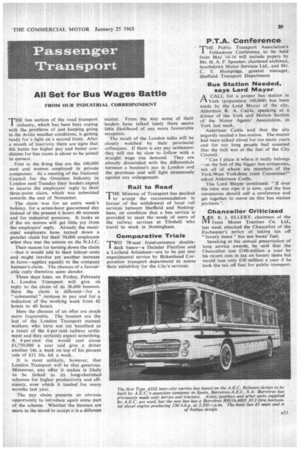All Set for Bus Wages Battle
Page 41

If you've noticed an error in this article please click here to report it so we can fix it.
FROM OUR INDUSTRIAL CORRESPONDENT
E bus section of the road transport rindustry, which has been busy coping with the problems of just keeping going in the Arctic weather conditions, is getting ready for a fight on a second front. After a month of inactivity there are signs that the battle for higher pay and better conditions for bus crews is about to be joined in earnest.
First in the firing line are the 100,000 men and women employed in private companies. At a meeting of the National Council for the Omnibus Industry in London next Tuesday their leaders expect to receive the employers' reply to their three-point claim, which was submitted towards the end of November.
The claim was for an extra week's holiday, for a seven-hour guaranteed day instead of the present 6 hours 40 minutes and for industrial pensions. It looks as if the six unions will get little joy from the employers' reply. Already the municipal employers have turned down a parallel claim for their 70,000 employees when they met the unions on the Their reason for turning down the claim —that it would add to their labour costs and might involve yet another increase in fares—applies equally to the company busmen's claim. The chances of a favourable reply therefore seem slender.
Three days later, on Friday, February I, London Transport will give its reply to the claim of its 38,000 busmen. Here the claim is different—for a " substantial " increase in pay and for a reduction of the working week from 42 hours to 40 hours.
Here the chances of an offer are much more fayourable. The busmen are the last of the London Transport manual workers who have not yet benefited as a result of the 6 per cent railway settlement and they certainly expect something. A 6 per cent rise would cost about £1,750.000 a year and give a driver another 14s. a week on top of his present rate of 16s. 6d. a week.
It is most unlikely, however, that London Transport will be that generous. Moreover, any offer it makes is likely to be linked to its long-cherished schemes for higher productivity and efficiency, over which it tussled for many months last year.
The• pay claim presents an obvious opportunity to introduce again some part of the scheme. Whether the busmen are more in the mood to accept it is a different
matter. From the way some of their leaders have talked lately there seems little likelihood of any more favourable reception.
The result of the London talks will be closely watched by their provincial colleagues. If there is any pay settlement they will not be slow to follow with a straight wage rise demand. They are already dissatisfied with the differentials between a busman's pay in London and the provinces and will light strenuously against any enlargement.
Rail to Road 'THE Minister of Transport has decided 1 to accept the recommendation in favour of the withdrawal of local rail services between Sheffield and Nottingham, on condition that a bus service is provided to meet the needs of users of the railway services at Tibshelf who travel to work in Nottingham.
Comparative Trials Till0 78-seat front-entrance doubleeck buses—a Daimler Fleetline and a Leyland Atlantean—are to be put into experimental service by Birkenhead Corporation transport department to assess their suitabihty for the City's services.
P.T.A. Conference
THE Public Transport Association's Folkestone Conference to be held from May 14-16 will include papers by Mr. H. A. F. Spooner, chartered architect, Southdown Motor Services Ltd., and Mr. C. T. Humpidge, general manager, Sheffield Transport Department.
Bus Station Needed, says Lord Mayor r-t A CALL for a proper bus station in
York (population 106,000) has been made by the Lord Mayor of the city, Alderman R. A. Cattle, speaking at a d:nner of the York and Mahon Section of the Motor Agents' Association, in York last week.
Alderman Cattle said that the city urgently needed a bus station. The matter had been talked about for too many years and for too long people had assumed that the ball was at the feet of the City Council, "Can I place it where it really belongs —at the feet of the bigger bus companies, not all of whom are members of the York/West Yorkshire Joint Committee?" asked Alderman Cattle.
The Lord Mayor continued: "If ever the time was ripe it is now, and the bus companies should call a conference and get together to move on this bus station problem ".
Chancellor Criticized
AfiR. R. J. ELLERY, chairman of the MI. Trent Motor Traction Co. Ltd., last week attacked the chancellor of the Exchequer's policy of taking tax off "luxury items" but not buses' fuel.
Speaking at the annual presentation of long service awards, he said that the Chancellor lost £100 million a year by• his recent cuts in tax on luxury items but would lose. only £30 million a year if he took the tax off fuel for public transport.
















































































































